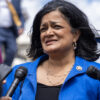Five years ago, Venezuela’s Hugo Chavez woke up the somnolent delegates to the United Nations General Assembly with his rude and undiplomatic President George W Bush is the Devil speech. This week, when the General Assembly meets in New York City and the focus falls upon President Obama and other world leaders, Chavez will be absent. He is forced to skip the U.N. event in order to undergo a fourth round of cancer chemotherapy in Havana.
His presence will not be missed.
At the General Assembly, world leaders hope to assure an anxious world that they have plans and ideas for fighting economic uncertainty, ending terrorism, curbing rampant criminality, and advancing democracy. Chavez has nothing to contribute on all four accounts. Recent developments drive home this point.
With the international economy on shaky ground, Chavez wants to add to the uncertainty. He wants to bring home his gold reserves. Meanwhile, he threatens to turn his socialism of the 21st century—allegedly achieved with compensation—into 20th-century communism or outright theft.
By threatening to withdraw from the World Bank’s International Centre for the Settlement of Investment Disputes, Chavez wants to walk away from $40 billion in outstanding claims. He believes that in an oil-thirsty world, even the U.S. will ignore his economic misdeeds and economic extortion and pay any price for his oil.
While the rise of a nuclear-armed Iran constitutes the gravest threat to world peace, Chavez promises to roll out the red carpet for fellow master of repression Iranian President Mahmoud Ahmadinejad in an upcoming official visit to Caracas. Iran and Venezuela remain critical allies in their axis of anti-Americanism.
Days after the 10th anniversary of the 9/11 attacks on the U.S., Nicolas Maduro, Chavez’s foreign minister, admitted on state television that Venezuelan authorities have made “permanent contacts to support” Venezuelan terrorist Ilich Ramirez Sanchez, a.k.a. Carlos the Jackal. Maduro said the Chavez regime is providing support “from a human standpoint,” an attitude that victims of terror around the world certainly find disconcerting.
In his prison rants, the unrepentant Ramirez previously praised Osama bin Laden and announced that for “rotting democracies” terrorism must remain a daily fact of life. Chavez praised Ramirez for being a “revolutionary fighter.”
Crime and narcotics trafficking remain global concerns—but not for Chavez. This September the Obama Administration identified four senior Chavez officials as backing the narco-terrorists of the Revolutionary Armed Forces of Colombia, placing them on the kingpins list, and the White House determined that Venezuela, along with Bolivia and Burma, “failed demonstrably during the previous 12 months to make substantial efforts to adhere to their obligations under international counternarcotics agreements.” Chavez calls it all a farce.
As for democracy, Chavez’s support for repression in Cuba, mayhem in Libya, and tyranny in Syria continues to raise eyebrows.
It is with good reason that Chavez’s absence from the podium at U.N. headquarters will bring a sigh of relief from those who unswervingly harbor the illusion that the U.N. remains the most effective forum for resolving international disputes and working for mankind’s betterment.


























